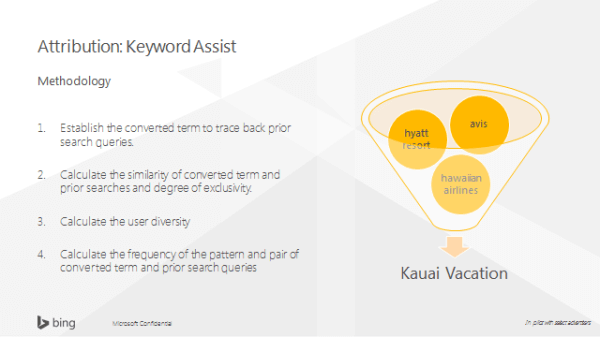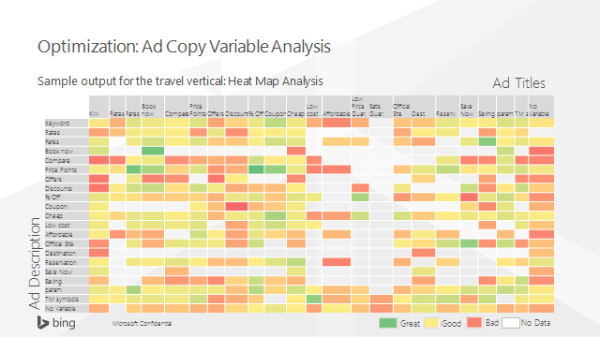Put Big Data To Work To Build Better Search Ads
Not too long ago, if I said “big data” to someone, I got a blank look in return. Now, big data is the topic du jour. People in healthcare, politics, industry… all are talking about it and how big data is changing the world. Simply put, the concept of big data reflects our growing ability […]
Not too long ago, if I said “big data” to someone, I got a blank look in return. Now, big data is the topic du jour. People in healthcare, politics, industry… all are talking about it and how big data is changing the world.
Simply put, the concept of big data reflects our growing ability to collect, store and analyze huge amounts of data. That data comes from all manner of sources – credit card purchases, posts on social media sites, public records, mapping software on mobile phones, search-engine queries, weather sensors – you name it. Everywhere in the world, devices and people send out a stream of digital signals about what they’re doing, seeing, hearing.
Those of us who work at a search advertising provider see big data up close. Bing Ads, which powers the Yahoo Bing Network, has 158 million unique searchers (comScore Explicit Core Search [custom], December 2013), all of whom make regular queries about shopping, the weather, what movie to see and more.
To those searchers, we service 5.3 billion monthly searches tens of billions of ads. And that’s a tiny fraction of the data that’s out there. We can add to our internal data information with that owned and sold by other companies, or available from public sources.
Putting Big Data To Work For Advertisers
Trouble is in many applications, all that information potential isn’t used well. There’s often simply too much of it to make sense of, and it can be difficult to know even what to look for. In essence, it’s not simply about big data anymore but about how you can use big data to get the right data.
I’m reminded of this great tweet from SMX London, which captures this essence perfectly.
.@AjitSivadasan #smx #keynote Big data is like teenage sex pic.twitter.com/iRVng7lQ1w— SMX London (@SMX_London) May 13, 2014
Fortunately, here at Bing Ads we have some really good data scientists. Today they’re working on some great ways to transform big data into the right data to make it useful for all of our advertisers, from a small corner boutique to a large enterprise.
How can big data help search advertisers? First of all, it can help advertisers figuratively peer into the future, using the power of big data to forecast search trends and buying patterns. That allows advertisers to predict changes in ad volume and cost over the medium to long term – say, three to 18 months.
Search providers can do this by analyzing historical and seasonal trends in search. We can look at trends for a particular advertiser, as well as draw on our enormous collection of click data. By sharing that information with advertisers, we give them the tools to better anticipate the campaigns and ad strategies that will work best.
For example, in the chart below, you can see a specific seasonal event: Valentine’s Day. We know that terms such as “chocolate” and “flowers” will have a lot of searches. But we also look for search terms that deliver similar results so advertisers can broaden their keyword use. We also map when searches peak so advertisers can design campaigns and plan budgets accordingly.
Uncovering More Converting Keywords
A second area where search providers are using the power of big data is in what we call attribution. The goal here is to help advertisers better understand the impact of keywords that don’t result in a conversion.
We do this by working to understand what customers are searching for before they convert – in other words, figuring out their search patterns up to the time they perform a search that leads to a conversion.
For instance, let’s say you own a travel company that specializes in vacations to Hawaii. You know that the phrase [Kauai vacation] results in conversions. But what other terms are people searching for before they key that in?
We can analyze search patterns to understand what related searches take place – such as [Hyatt resort] or [Avis]. We also can correct for terms that aren’t useful, such as [Facebook]. That way, advertisers can take advantage of more keywords that are relevant and apt to lead to a conversion.
Creating Better Campaigns
Finally, search providers are using big data to give advertisers the ability to create effective ads without the trial and error. We’re doing that by analyzing our marketplace to figure out word combinations, attributes and ad formats that result in the most clicks.
In our studies here at Bing Ads, we use a controlled set of keywords across thousands of ads within different vertical markets. We also control for ad position, user signals, brand terms and so on. Then we score the ads for ad quality – a measure of their clickability as well as other factors. These ads receive better ad rankings and lower cost-per-clicks.
We then take our analysis and create an ad copy “heat map,” which helps identify the best title and description combinations. Here’s a heat map for the travel vertical:
A green box, for example, tells us is that an ad headline with the phrase “Percent off,” and ad copy that reflects “Price points” (such as “Travel now for only $500”) is likely to perform well.
This saves time for advertisers as they can begin creating ads using headline and copy combinations that we know perform well – no guesswork involved!
Today, we’re just scratching the surface of what we think big data will offer advertisers in the years to come. But, we know now that we can use big data to offer advertisers insight to ad campaigns, deliver greater transparency to how we envision marketing success and make improvements to the advertising marketplace.
It’s an exciting time to be in search advertising. I hope you’ll start to put big data to work in your campaigns. I think you’ll like the results.
Contributing authors are invited to create content for Search Engine Land and are chosen for their expertise and contribution to the search community. Our contributors work under the oversight of the editorial staff and contributions are checked for quality and relevance to our readers. The opinions they express are their own.
Related stories
New on Search Engine Land



